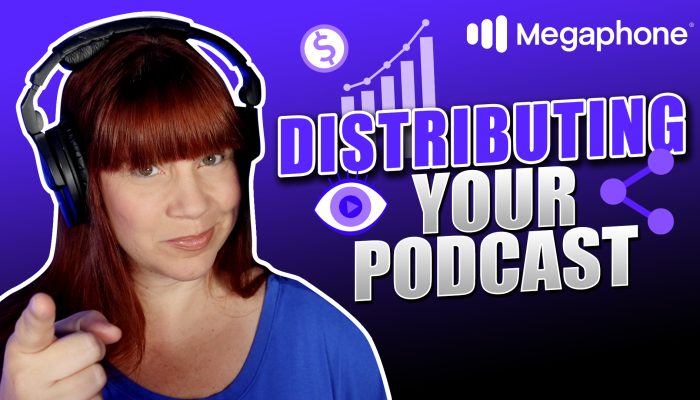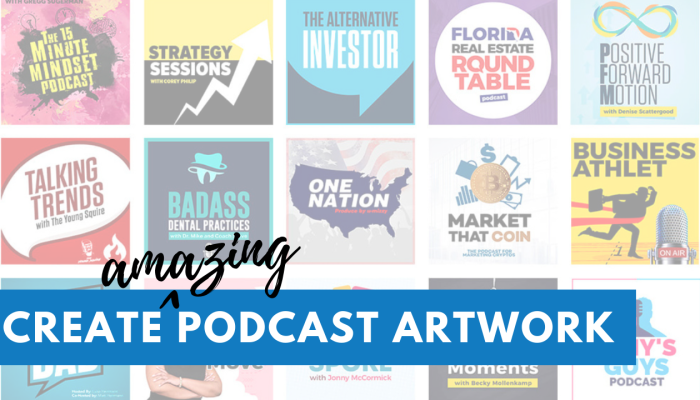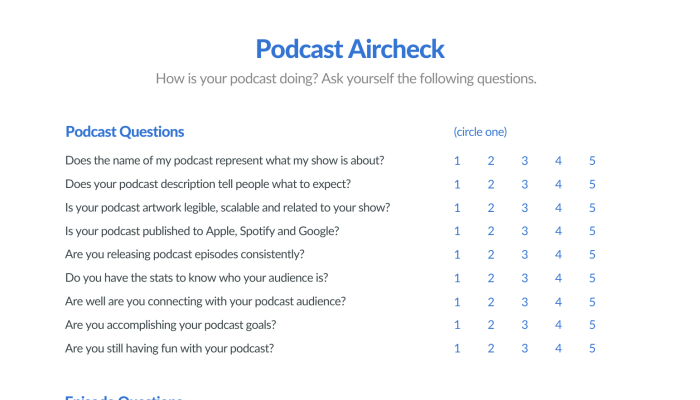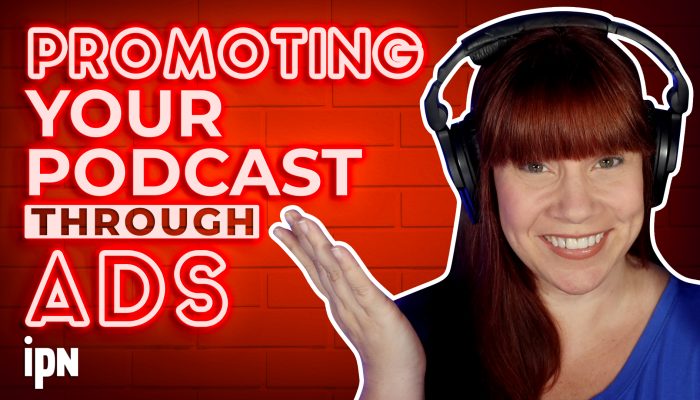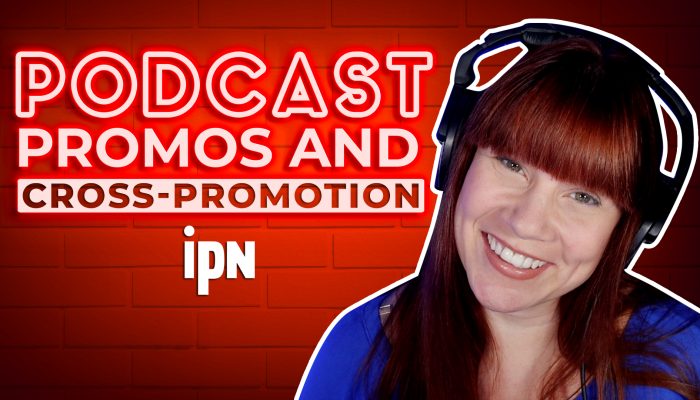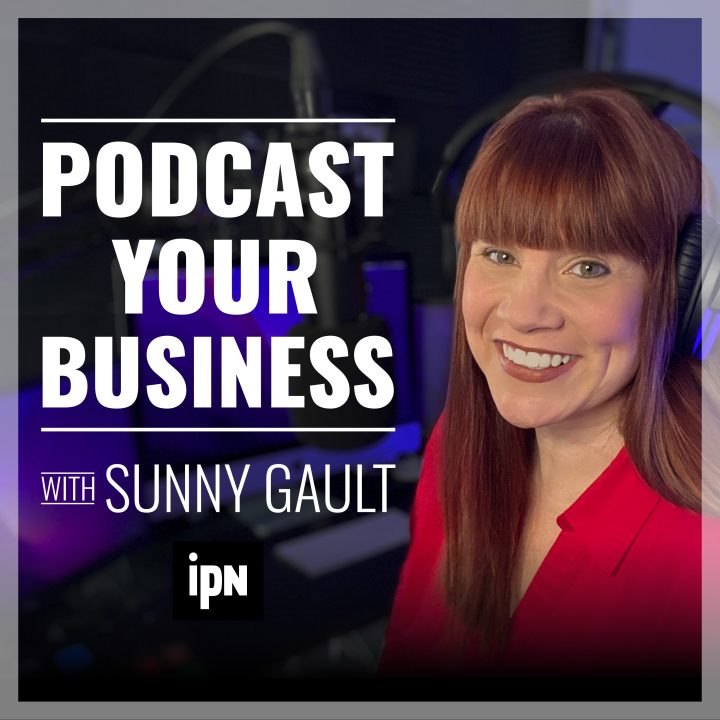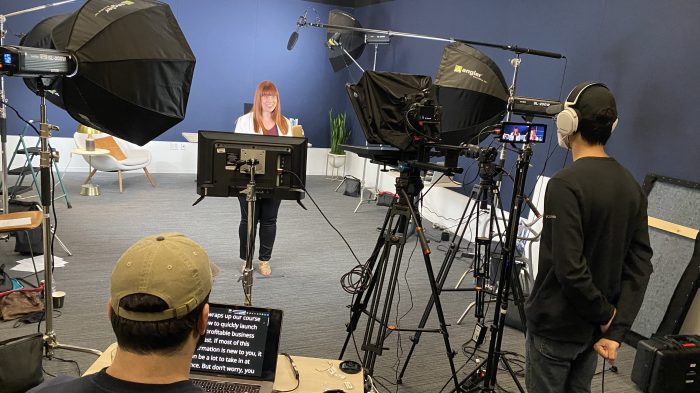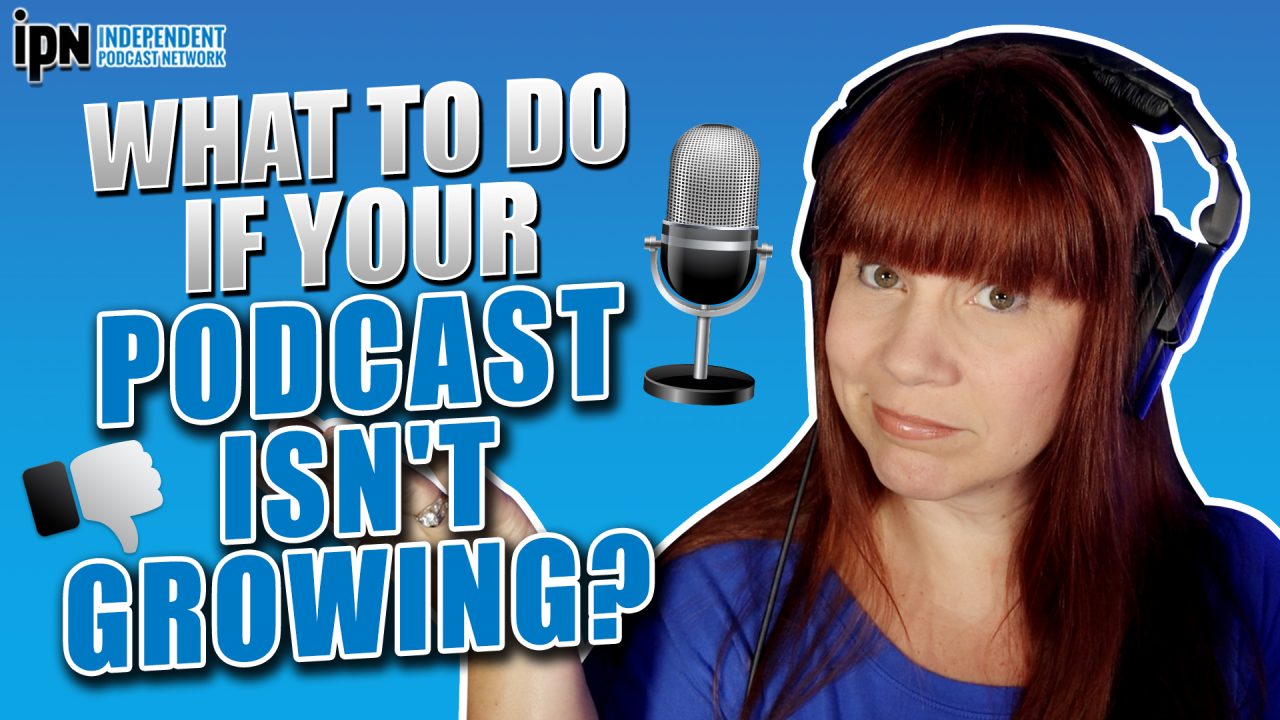
it’s time to pivot to help your podcast
You work hard on your podcast. So, it can be frustrating if your download numbers start to plateau. The same strategies that worked originally may not work for the next phase of your podcast. It’s time to pivot. Today we’re talking about what you can do if your podcast isn’t growing.
Here’s what we’re talking about today…
- Ways to evaluate your overall podcast growth
- Reviewing your podcast’s strengths and weaknesses
- How narrowing down your podcast niche can help
- Ways to re-connect with your audience
- Alternative marketing strategies
what questions should you ask when reviewing your podcast?
What areas should you be critiquing when you do an aircheck for your podcast? This guide breaks down some of the main topics to consider. Feel free to add your own!

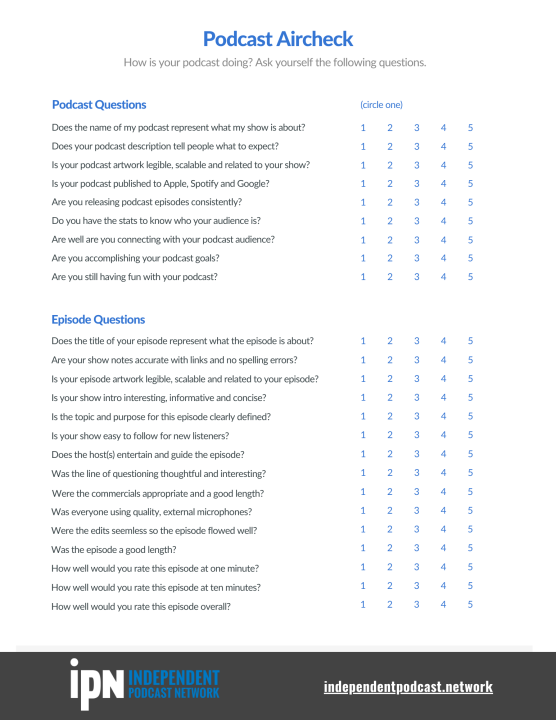
Episode Transcript
0:00
You work hard on your podcast. So it can be frustrating if your download numbers start to plateau, or maybe even drop, the same strategies that worked originally may not work for the next phase of your podcast. It’s time to pivot. Today, we’re talking about what you can do if your podcast isn’t growing. Take it away, Mister radio man. Podcast Your Business.
0:31
Hello, everybody. Welcome to this podcast. It’s called Podcast Your Business. And I’m Sunny Gault. I’m a podcast coach and mentor and I’ve been podcasting for a long time. They commit the 17 year count. Now, I don’t know when you get past 10. It’s like, Yeah, whatever. I’m also the founder and CEO of a company called Independent Podcast Network, you can find us at https://independentpodcast.network. It might be the longest URL in history. But it’s great for SEO. So today, I’m here to help you create amazing podcasts for your business. And we do this by mastering the five Ps o podcasting. What are the five Ps of podcasting, this is something that I created in the very first course that I launched for podcasters. And we break it down in five Ps, because I believe if you master these five Ps, then you really are doing good with your podcast. And it’s something we should all strive for it right. So the five P’s are prep, plan, produce, promote, and profit. When we talk about prepping for a podcast, that’s before you even start your show. It’s asking yourself questions about is this a good idea for you? And why are you thinking about starting a podcast in the first place, then plan is diving into the format of your show, and getting a good idea for the look and feel of your podcast producing is actually creating the content, whether it’s audio or video promoting, is telling everybody about it, that’s a good idea. Because if people don’t know about it, it’s kind of like your podcast doesn’t exist. And finally, profit, we have to be making money with our podcasts. Now, if you just wanted to do a fun podcast, more power to you. But if you’re listening to this show, it’s because you’re thinking about doing a podcast, or perhaps you’ve already started, where the podcast is focused on your business. So somehow it has to bring in revenue, maybe that’s clients, maybe that’s just getting you a foot in the door with other industry experts. So you can launch other projects together, whatever it is, you need to make money. So Mr. radio man, what are we talking about today? Promote.
2:45
Promote, honestly, this could fall into several different pieces. But I decided to put it in promote, because we’re really focused on what do we need to do to grow our audience? And when we think about audience growth, that usually gets lumped into marketing and promotion. So there you go. Now I have yet to meet a podcaster, who doesn’t want their audience to grow? No, thank you. I have enough listeners or viewers. No more audience members for me. I do not need second helpings. So I mean, that sounds ridiculous, right? But how do we make this happen? And how do we do this on a consistent basis? The answer to that question is you have to adapt. It’s like your own business. What started, you know, working in the beginning and got you to this point may not work moving forward. Sometimes it does. But then usually, at some point, you plateau, where you get to a point where you’re just not growing anymore, and then you have to adapt and your podcast. It’s the same way. So here are some of the things we’re going to talk about. In today’s episode, we’re going to focus on ways to evaluate your overall podcast growth, because how do you know that your podcast isn’t growing if you’re not tracking things, and it doesn’t have to be super complex. In fact, I’m one of those people. I don’t like to make things complicated. I don’t like to check in every day to see what my download numbers are. So I’ve got some tools and resources for you guys on that. We’re also going to talk about reviewing your podcast strengths and weaknesses because sometimes your show has plateaued, because you’re at the top of a certain level, and it’s time to up your game. In order to get a different podcast audience. It doesn’t mean you’re leaving your old one behind. Okay? But you’re just trying to open yourself up to more people. So we’re going to talk about that and then narrowing down your podcast niche or niche how do you actually say that everyone’s got a different way of pronouncing it tomato tomahto. So what we’re gonna go with niche today, I’m feeling fancy. And you would be surprised at how many times I see a podcast that is all over the place as far as who they’re actually trying to reach out to. We’re also going to talk about ways to reconnect or even connect with your audience because if you’re not doing that, oh, That is a missed opportunity, my friend. And at the end, we’ll talk about some additional marketing strategies. Some of these you’ve probably heard before, but it’s a good refresher. Okay. We’ll get started on all this right after this quick break.
5:14
Whenever I talk about podcast download numbers plateauing or even dropping, people start to freak out right, the energy changes in the room. I am here to tell you first and foremost, if this happens to your show, please do not panic. Sometimes the reason for this is completely out of your control. I remember several years ago, the IAB which I’ve talked about on the show, the Internet Advertising Bureau, changed the way in which downloads were counted on podcasts or impressions, whatever you want to say. And it seemed like overnight, everybody’s podcast numbers dropped by some crazy about like cutting naff or something like that. And podcasters were freaking out. But it had nothing to do with their podcast, this was just a change in the industry. Another example I’ll give you is when COVID hit. So as you guys know, a lot of my podcasts focus on pregnancy and parenting and family stuff. And when COVID hit, I know there’s a lot of podcasts out there whose numbers went through the roof, it was amazing. But for me, my audience is parents who suddenly had to help teach their kids at home and balance a million other things that were going on. So my podcast download numbers decreased by more than 50% in the first month of COVID. And honestly, they’re still not back to where they were prior to COVID. Did I give up did I throw in the towel? No, because something else happened in the industry at the same time, we had more advertisers getting into the space. So even though my download numbers aren’t what they used to be, I’m making more money with my podcast. So for me, you know, it’s not just a numbers game of how many people are listening to your show. It’s the overall success of your show, and what you’re able to do with the numbers that you do have. So I tell you this whole thing, just to say, don’t panic if this happens. But let’s dive into this. Because if it does start to happen, and you want to change it, there are definitely some things that I would recommend.
7:26
First, let’s talk about ways to evaluate your overall podcast growth. I am not one of those people that will log into a site on a weekly basis or even a monthly basis. It’s just not my thing to look at download number, sometimes I have to do it because I help podcasts and we want to see the growth of their shows. But when it comes to my own stuff, I actually don’t get much out of that. Okay, so I don’t do Google Sheets. I know a lot of people kind of get really into it and all that good stuff. But there is an app that I would recommend that you check out there’s a free version of it and a paid version. Go to Potter, app.com, P O D D E R A P P.com. This is one of the best resources that I have found for tracking stats for your show. Demographics stats, like they have a bunch of different things much better than chargeable by the way, sorry, charitable, but Potter is legit. Now, if you go with the paid option for me, that was a little pricey. But you may decide that that works fine for your show. I was also looking at, you know, pricing for multiple podcasts. But if you just have one show, it might work. But you need to know what your stats are, you’ve got to have you have to have the data, I say data. My nine year old daughter the other day is like it’s data. So data, data, whatever, you need a tracking tool. So you know how your podcast is shaping up. And it should allow you to go back and see the data data for many months. Or if you’ve been podcasting over a year, you know, you want to start to see trends. Okay? So find a tool that works for you to be able to evaluate how your podcast is faring when you’re up when you’re down. All that good stuff.
9:19
You also need to take a closer look at your podcast strengths and weaknesses. This is a great time. And we’ve talked about this on the show before for you basically to do an audit of your show. I call it an air check. If you haven’t listened to that episode, go back. Listen to the episode that we did on air checking your show, we can actually help you out my network can help you out if you need a non biased person to take an objective look for you. But this is a great time to look at your show in a very objective way and say how can I improve because what got you to this point, let’s say A, you know, you had a microphone. But yeah, you know, you can still hear all the background noise and some listeners just won’t put up with that. Okay, they’re used to listening to the podcast from the big podcast networks out there where the audio is pristine. So think about different things that you can do a may not be just focused on technology and your equipment. But it may be the overall format of your show, maybe it’s a little bit too long, maybe it’s too short, you know, maybe the interviews need to be broken up somehow, maybe you need to add some segments and stuff like that, because there are some really picky podcast listeners out there. So just be open to this idea of getting some help with your show and a quick little teaser. I do have a free gift that can help you with this. So I’m going to tell you about at the end of this episode. I also want to talk about narrowing down your podcast niche. All right, because I see this happen a lot with podcasts. And I’m kind of surprised by it. Because common sense would tell you you hear this all the time, you can’t be all things to all people. So why do we launch a show and be like, Oh, this is for anybody that likes cars, or this is for you know, anybody that likes to exercise or whatever? I mean, that’s way too broad. I find a lot of people wanting to start podcast to help people to tell inspirational stories. There’s nothing wrong with that. But what kind of inspirational stories are you telling? Because just to be oh, we’re going to tell business stories of people that are successful. Honey, that has been done 1,000,001 times. So how is someone looking at your podcast, which by the way, they’re just scrolling through, and maybe your podcast pops up? So they’re really judging you by your podcast artwork. But how are you going to stand out because there’s so many other people doing that. And they may have better technology, better equipment, all this other stuff could be going against you. So please narrow things down, you are not limiting yourself, what you’re actually doing is you’re becoming an authority in a very specific area. And you’re making your content more valuable for that select audience. And guess what, advertisers will pay a premium to connect with that audience. So it’s actually better for everyone, you can really dial it in, advertisers are going to be more interested, you got to find the right ones. But a lot of times advertisers want to get really niche because that’s the power of podcasting. You can’t really do that on radio and TV, because they’re trying to appeal to a mass audience. You’re not necessarily trying to do that with a podcast. So all of you know what mainstream media is doing. Forget it, that has nothing to do with podcasts. Okay, so look at who you’re reaching out to figure out if you can narrow it down and make it more niche because I’m feeling fancy today.
13:02
Let’s also talk about reconnecting with your audience. This is a biggie, if you didn’t do this, when you started your podcast, then hold your horses, everybody, because you need to find a way to connect with your audience. That’s what makes podcasting so powerful. You know, we’re tired of just being talked to through a television set or, you know, through the radio, we want to have an an more active approach and the content that we’re consuming. So use your tracking tool, find out who your audience is. And that tool can also tell you how they’re listening, right? Are they listening through a browser? Are they listening through an app, there’s a whole, you know, a lot of different information you can discern from these statistical tools, but find out who they are. So you know, who you’re actually reaching out to. And then cater your content to that audience. Make it more niche, right, this goes back to being niche. And then I would also encourage you to find ways that your listeners or if you’ve got a video podcast, your viewers can engage not only with you, because they may want to do that too. But with your content. Whenever I started a new podcast, that’s one of the first things I do. I’m like, Okay, how can people get involved in this show? Because I know it kind of sounds silly, but people do this with podcasting. But the first thing I thought of was radio, you know, you have those like radio colons, and people are so excited because they’re on the air. It’s like, oh my god, I’m color five, and I want these tickets. So people want to be part of the content. And if you are reading reviews, let’s just say for people that left reviews for your podcast, or people send you an email about how much they liked the show, whatever it is, or maybe you’ve got different segments that they can participate in, like, you know, send us your favorite parenting story or you know, a time that you really failed as a parent, whatever it is, get them involved in the content, and I promise they will be your best advocates moving forward, they’re gonna tell everyone about it, because you are on this spot or they were on this podcast, right and you made it happen. So your audience is just super, super important. So make them feel special guys. And then lastly, just want to briefly talk about some alternative marketing strategies. The big one that I feel like a lot of people forget is S E O Search Engine Optimization. Now, quick story about three or four years ago, I went cold turkey, on all social media platforms, meaning I had accounts everywhere for all of my podcasts. And I woke up one day and said, I am done with this and deleted all the accounts. But I still have to promote my podcast. So what I did is I invested my time and my energy and some money into the SEO for my website. I’m talking about the parenting shows now because I’m a parent, right? And whenever I had a parenting concern, or something I wanted to know more about the first thing I did was I Googled it. I went to Google and I typed it in, I didn’t go to Facebook and see what such and such group was talking about. I didn’t care about that I needed an answer right then because there was a baby screaming in the background. And I was going crazy. So I just use that information. And I was like, okay, yeah, let’s totally invest more in the website and keywords and things like that. And that’s how most people end up finding our podcast now, which are still growing guys. And let’s see the shows launched in 2012. Come on. I mean, I said earlier, we actually, you know, because of COVID, we kind of went backward, but now we’re building again, because we didn’t give up, right? So don’t forget about the power of SEO, I would also say another strong marketing technique. And this does take a little bit of time. But if there are online groups, and it doesn’t have to be on social media, I know that’s what everyone thinks of. But if there’s other groups out there that are online, that you can join, for community purposes. Not only that, but it gives you great ideas for content, because whatever they’re talking about, that’s what your episode should be about. Okay. So I would encourage you guys to look at those groups. And then you know, when it comes to social and everything, I don’t find that there is a ton of conversion from people listening, like something’s promoted on social to someone actually listening to that episode. So I don’t, you know, as I just said, I don’t invest a lot in social media. But if that is your thing, just don’t do everything at once. Because there’s a new social media site that comes out like every day, it seems like and you can spread yourself superduper thin. So again, go back to your stats, find out what’s working, I would say pick one, if you’re going to do that, and invest your time in that. Don’t do everything at once, your head might explode. And that would be very, very messy. All right, I promised you guys a freebie. And that is coming up after this quick break.
18:10
Earlier we were talking about air-checks for your podcast episodes. And when I did the podcast episode four that when we talked all about air-checks, I created this handout. And I want to tell you guys about it again, in case you missed it the first time I went through and I thought about what questions podcasters should be asking themselves if they’re doing their own self-check for their own air-checks, right? So if you’re listening to an episode, and you’re like, Okay, do I need to improve stuff? What are some of the questions and you know, how can you rate some of this to know what needs to be improved? If you want my free PDF on those questions and topics to consider. I have a link in the description for today’s episode, but so be sure to check that out. That is on our website for https://independentpodcast.network. We have so much amazing free content on the site, guys. So if you are just getting started with podcast, or if there’s a specific topic you want to know a little bit more about just search in the search bar on our website. We’ve got blog posts, more podcast, episodes, videos, handouts. I have whole courses on there. In fact, we just launched was it last month or the month before we launched a whole course about dynamic ad insertion, and how running those types of ads on your show can be really great not only for you, but for advertisers. So I’m always doing brand new content. Check out the website for more info. Until next week…remember, podcasts are awesome!

